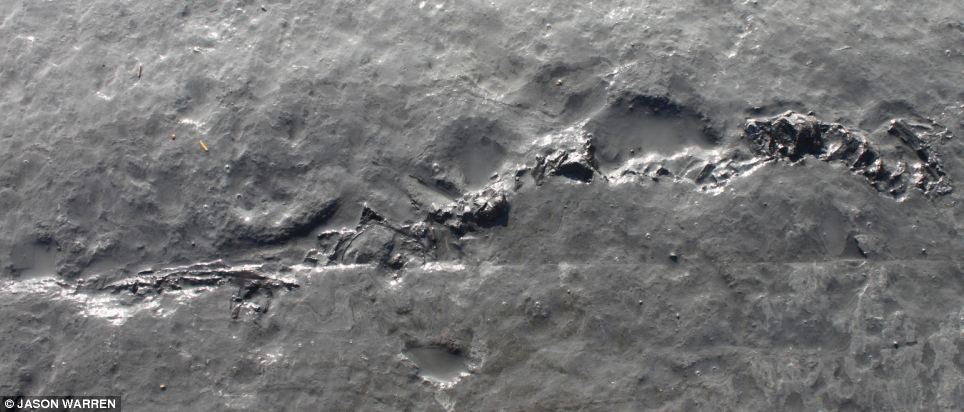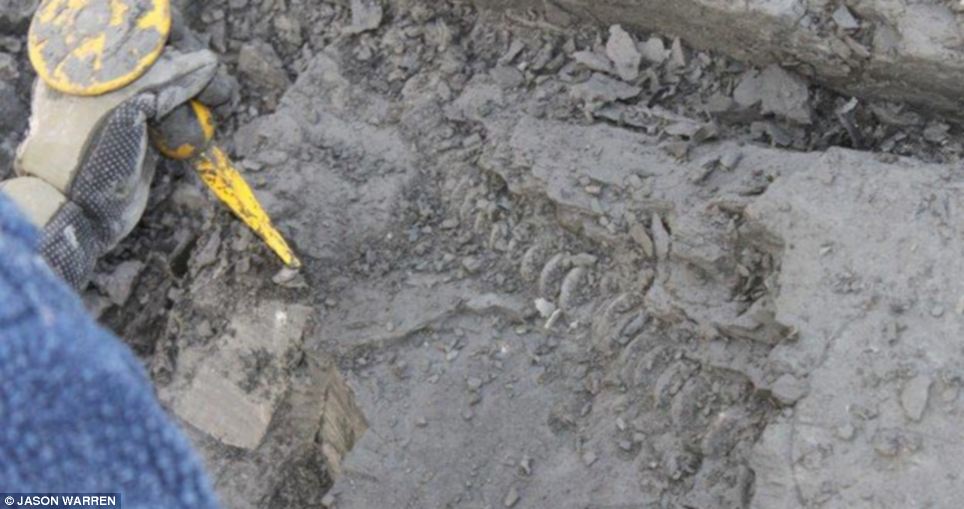The Jurassic Coast has been packed with fossil hunters (or should that be money hunters?) since a giant marine reptile worth £15,000 was found on a beach on Boxing Day.
The near-complete ichthyosaur skeleton was discovered by hobby collector Alan Saxon, from Chippenham in Wiltshire, who was on a post-Christmas visit to the Jurassic Coast.
For many decades people have come from all over the country for a day's fossil hunting along Britain's Jurassic Coast - a 96-mile-long world heritage site along the south coasts of Dorset and Devon in south western England, which gets its name from its cliffs which were formed 180 million years ago.
But scientists are increasingly concerned that the lucrative market in dinosaur remains is driving a booming illicit trade in fossil poaching.
Many experts claim that these irreplaceable ancient treasures, which are vital for our understanding of Earth's history, are ending up not in laboratories or museums but on the walls of business HQs, Russian oligarchs' mansions and even, in one case, the bottom of a Japanese billionaire's swimming pool.
On the Jurassic Coast, a fossil-collecting code allows the removal of fossils provided the cliff-face is not damaged, and the code requires rockhounds to notify the authorities only if a particularly important find is made.
Professional fossil hunter Paul Crossley told the BBC: 'The word is already out that Lyme Regis is the capital of fossil hunting at the moment, we've seen more people than normal on the beaches.'
The first complete plesiosaur skeleton ever found was discovered by Mary Anning on the Jurassic Coast at Lyme Regis in Dorset in the early 1800s, although fossilised plesiosaur remains were found along the Jurassic Coast even earlier.
It was the British who discovered dinosaurs, being the first to realise that these ancient remains that had been found for centuries were not dragons but some unknown ancient reptiles.
Gold rush: Jurassic Coast is packed with treasure hunters after ichthyosaur skeleton worth £15,000 is discovered during a Boxing Day walk
Britain's 96-mile-long Jurassic Coast has been packed with treasure hunters since 5ft fossil was found
Ichthyosaur skeleton discovered by hobby collector Alan Saxon on Boxing Day after it was uncovered by storms
Scientists are increasingly concerned that the lucrative market in dinosaur remains is driving a booming illicit trade
By Daily Mail Reporter
19 January 2014
Daily Mail
Daily Mail
The Jurassic Coast in Dorset has been packed with treasure hunters since a giant marine reptile fossil worth £15,000 was found on a beach on Boxing Day.
People come from all over the country for a day's fossil hunting along Britain's Jurassic Coast - a 96-mile-long world heritage site, which gets its name from its cliffs which were formed 180 million years ago.
The near-complete ichthyosaur skeleton was discovered by hobby collector Alan Saxon, from Chippenham in Wiltshire, who was on a post-Christmas visit to the Jurassic Coast.

Fossil hunters: The Jurassic Cliffs at Charmouth in Dorset have never been more busy since a fossil worth £15,000 was found on the beach on Boxing Day

Find: The skeleton - which is about 5ft long - was found at the base of Black Ven near Charmouth
The 5ft fossil was uncovered due to heavy storms and was found at the base of Black Ven near Charmouth.
The giant marine reptile fossil was painstakingly removed over eight hours and professional fossil hunter Paul Crossley, who helped excavate it, said it was 'a beautiful find'.
Mr Crossley told the BBC: 'The word is already out that Lyme Regis is the capital of fossil hunting at the moment, we've seen more people than normal on the beaches.
'We always advise going when the tide is falling and always stay well away from the cliffs and mudslides. Use common sense.'
Fossil-hunting is big business. Fossils - the remains of dead organisms preserved in rocks - can fetch millions.

A fossil expert works to uncover the rare skeleton - which is worth £15,000 - discovered by hobby collector Alan Saxon


But scientists are increasingly concerned that the lucrative market in dinosaur remains is driving a booming illicit trade in fossil poaching.
Many experts claim that these irreplaceable ancient treasures, which are vital for our understanding of Earth's history, are ending up not in laboratories or museums but on the walls of business HQs, Russian oligarchs' mansions and even, in one case, the bottom of a Japanese billionaire's swimming pool.
On the Jurassic Coast, a fossil-collecting code allows the removal of fossils provided the cliff-face is not damaged, and the code requires rockhounds to notify the authorities only if a particularly important find is made.



People come from all over the UK for a day's fossil hunting on the beach especially on a sunny weekend

The word "dinosaur" was coined in 1842 by British palaeontologist Sir Richard Owen, who used it to refer to the "distinct tribe or sub-order of Saurian Reptiles" that were then being recognised in England and around the world
In April the remains of a 195-million-year-old reptile were discovered on the Jurassic Coast.
Geologist Richard Edmonds stumbled across the 18-inch fossil of an ichthyosaur - a dolphin-like sea creature - near Lyme Regis.
Mr Edmonds spotted a small part of the perfectly-preserved jaw of the extinct reptile sticking out of the mud - and said he almost ignored it.
But on closer inspection the 50-year-old fossil hunter realised it was a full ichthyosaur jaw.
THE JURASSIC COAST

The Jurassic Coast is a World Heritage Site on the English Channel coast of southern England. The site stretches from Orcombe Point near Exmouth in Devon to Old Harry Rocks near Swanage in Dorset, a distance of 96 miles.
The Jurassic Coast consists of Triassic, Jurassic and Cretaceous cliffs, spanning the Mesozoic Era, documenting 180 million years of geological history
The site shows excellent examples of landforms, including the natural arch at Durdle Door, the cove and limestone folding at Lulworth Cove and an island, the Isle of Portland. Chesil Beach is a fine example of both a tombolo (a deposition landform in which an island is attached to the mainland by a narrow piece of land such as a spit or bar) and a storm beach (a beach affected by particularly fierce waves). The site has stretches of both concordant and discordant coastlines. Due to the quality of the varied geology, the site is the subject of international field studies. This area was home to Mary Anning, a palaeontologist who studied the fossils of the coastline around Lyme Regis and discovered the first Ichthyosaur fossil ever found anywhere in the world at the Spittles.

Chartered in 2001, the Jurassic coast was the second wholly natural World Heritage Site to be designated in the United Kingdom. Its entire length can be walked on the South West Coast Path. The site was featured on the television programme Seven Natural Wonders as one of the wonders of the South West (of the UK), and in a 2005 poll of Radio Times readers, the Jurassic Coast was named as the fifth-greatest natural wonder in Britain.




There are plenty of great fossils along the Jurassic Coast
Last edited: